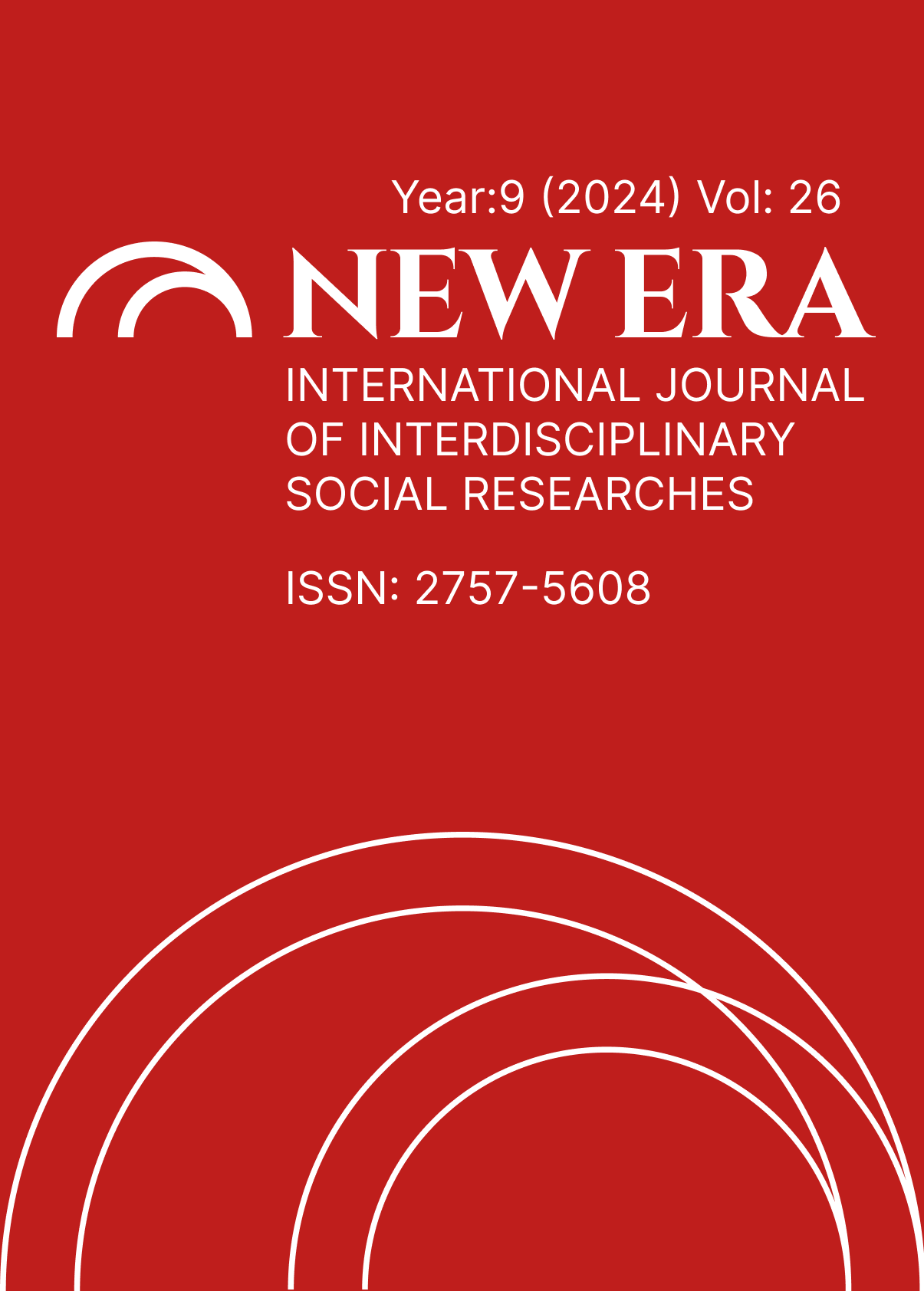THE RELATIONSHIP BETWEEN NEPOTISM AND EMPLOYEE PERFORMANCE
DOI:
https://doi.org/10.5281/zenodo.14552806Anahtar Kelimeler:
Örgüt performansı, Nepotizm, Nitel Araştırma.Özet
Özet
Çalışmanın amacı, nepotizmin çalışan performansı üzerindeki etkilerini derinlemesine incelemektir. Çalışmanın
gerekçesi; nepotizmin, birçok örgütte yaygın olarak karşılaşılan bir uygulama olmasına rağmen, bu konunun
çalışanın performansı üzerindeki etkilerinin yeterince araştırılmamış olmasıdır. Bu bağlamda çalışma,
yöneticilere ve liderlere nepotizmin yaratabileceği sorunlar hakkında farkındalık kazandırmayı ve bu tür
uygulamaların örgütsel performans üzerindeki uzun vadeli etkilerini, anlatarak rehberlik etmeyi de
amaçlamaktadır. Çalışmanın sonuçları, nepotizmle başa çıkma stratejileri geliştirme, örgütlerde daha adil
yönetim politikaları oluşturma ve örgütlerin performanslarını geliştirme noktasında literatüre önemli katkılar
sunacaktır. Araştırmanın yöntemi literatür taramasıdır. Araştırma için öncelikle çalışmanın değişkenlerinin
tanımlarına değinilmiştir. Ardından değişkenler arasındaki ilişkileri açıklayan kuramsal alt yapı oluşturulmuştur.
Daha sonra bu değişkenleri ele alan çalışma ve sonuçları titizlikle incelenerek hipotezler oluşturulmuştur. Son
olarak araştırma sonuçlarına dayanarak örgütlere tavsiyelerde bulunulmuştur. Yazın taraması için Google
Akademik, ScienceDirect, Web of Science gibi indeksler taranmıştır. Araştırma sonucuna göre; nepotizm ve
çalışan performansı arasındaki ilişki negatiftir.
Anahtar kelimeler: Örgüt performansı, Nepotizm, Nitel Araştırma.
Referanslar
Akar, F. (2023). The Relationship Between Nepotism and Employee Performance. Journal of Business Sciences, 18(3), 256-271. https://doi.org/10.1080/12345678.2023.98765
Akar, S. (2020). Nepotism as an Ethical Problem in Organizational Culture. International Journal of Management Academy, 3(1), 241-251.
Aktuğ, M. (2016). The Impact of Organizational Justice and Organizational Trust on Employee Performance (Master’s thesis, Istanbul Gelisim University, Institute of Social Sciences).
Altıntaş, T. (2020). A Study on the Relationship Between Nepotism and Organizational Justice. Journal of Nazilli Faculty of Economics and Administrative Sciences, 1(2), 65-76.
Aras, G. (2020). Nepotism in Organizations and Its Impact on Organizational Behavior. Journal of Organizational Studies, 15(3), 45-60.
Bass, B. M. (1985). Leadership and Performance Beyond Expectations. New York: Free Press.
Baş, F. F. (2019). The Effects of Nepotism on Employee Behavior. (Master’s thesis, Uludağ University, Institute of Social Sciences, Bursa).
Blau, P. (1964). Exchange and Power in Social Life. New York: Wiley.
Bulut, Z. A. (2004). Performance Evaluation Practices in Businesses and the Methods Applied. Legislation Journal, 7(7), 1-10.
Burns, J. M. (1978). Leadership. New York: Harper & Row.
Büte, M. (2011). The Effects of Nepotism on Employees and Its Relationship with Human Resources Practices. Journal of Atatürk University Institute of Social Sciences, 15(1), 383-404.
Büte, M. (2015). Does Job Stress Play a Mediating Role in the Relationship Between Nepotism and Job Satisfaction? Dumlupınar University Journal of Social Sciences, 29.
Büte, M., & Tekarslan, E. (2010). The Effects of Nepotism on Employees: A Field Study on Family Businesses. Journal of Economic and Social Research, 1-21.
Cankurtaran, Y., & Tengilimoğlu, D. (2022). The Mediating Role of Job Satisfaction in the Effect of Perceptions of Nepotism on Organizational Commitment among Academics in Universities. Journal of Business Research, 14(4), 3193-3208.
Çalık, A., & Naktiyok, A. (2018). The Role of Self-Efficacy Perception in the Effect of Nepotism on Organizational Silence. Ege Academic Review, 18(3), 343-351.
Çetin, M. (2022). The Impact of Nepotism on Job Satisfaction: A Study on Family Businesses. Journal of Business Management, 21(4), 87-102. https://doi.org/10.1016/j.busman.2022.08.014
Demirel, Y., & Savaş, Y. (2017). The Impact of Nepotism on Innovation and Talent Management. Manas Journal of Social Research, 6(1), 129-142.
Döner, N., & Uyar, A. (2021). Nepotism and Perception of Organizational Justice: Its Effects on Employee Satisfaction. Journal of Economics and Management Research, 34(2), 45-58. https://doi.org/10.1234/ikam.2021.34567
Elçi, M., & Şener, İ. (2020). The Effects of Nepotism on Organizational Commitment and Job Satisfaction. Social Sciences Journal, 14(1), 133-145. https://doi.org/10.2139/sosbil.2020.8912
Festinger, L. (1954). A Theory of Social Comparison Processes. Human Relations, 7(2), 117-140.
Firfiray, S., Cruz, C., Neacsu, I., & Gomez-Mejia, L. R. (2018). Is Nepotism So Bad for Family Firms? Human Resource Management Review, 28(1), 83-97. https://doi.org/10.1016/j.hrmr.2017.05.008
Greenberg, J. (1987). A Taxonomy of Organizational Justice Theories. Academy of Management Review, 12(1), 9-22.
Güngören, M. (2017). The Effect of Perceived Organizational Culture on Job Satisfaction and Job Performance: A Study in the Aviation Sector.
İşlek, S. (2019). The Impact of Nepotism on Employee Performance in Family Businesses. [Master’s thesis, Beykent University].
Kaba, A., & Aktaş, H. (2018). The Effect of Nepotism and Perception of Organizational Justice on Individual Performance. Proceedings of the National Management and Organization Congress, 26, 292-296.
Karakavuz, H., & Çini, M. A. (2023). The Mediating Role of Job Stress in the Impact of Nepotism on Job Performance: A Study on Academics. Malatya Turgut Özal University Journal of Business and Management Sciences, 4(2), 107-122.
Kaya, A. (2021). Leadership, Nepotism, and Organizational Commitment. International Journal of Management, 8(4), 99-110.
Özmen, F., & Kahraman, Y. (2020). A Comparison of Nepotism, Job Satisfaction, Job Stress, Organizational Commitment, and Their Subdimensions According to Sectors. Balkan and Near Eastern Social Sciences Journal, 6(2), 121-130.
Öztürk, N. (2023). The Effect of Nepotism Perception on Employee Performance: The Mediating Role of Organizational Support, Organizational Justice, and Organizational Trust. (Master’s thesis). YÖK Thesis. (805735)
Tajfel, H., & Turner, J. C. (1986). The Social Identity Theory of Intergroup Behavior. In S. Worchel & W. G. Austin (Eds.), Psychology of Intergroup Relations (pp. 7-24). Chicago: Nelson-Hall.
Tekin, Y. F. (2023). Teachers’ Perceptions of Organizational Justice, Motivation Levels, and Performances: A Structural Equation Modeling Approach.
Turgut, Y. (2022). Nepotism in the Workplace and Organizational Behavior. Human Resources and Management Journal, 29(1), 72-85. https://doi.org/10.1016/j.hrman.2022.03.015
Yıldırım, N., & Tokgöz, N. (2020). The Relationship Between Nepotism and Organizational Commitment: A Study on Hospital Employees. Journal of the Institute of Social Sciences, 14(3), 157-180.
İndir
Yayınlanmış
Nasıl Atıf Yapılır
Sayı
Bölüm
Lisans
Telif Hakkı (c) 2024 NEW ERA INTERNATIONAL JOURNAL OF INTERDISCIPLINARY SOCIAL RESEARCHES

Bu çalışma Creative Commons Attribution-NonCommercial 4.0 International License ile lisanslanmıştır.


